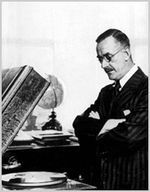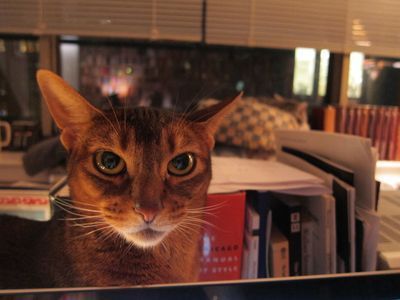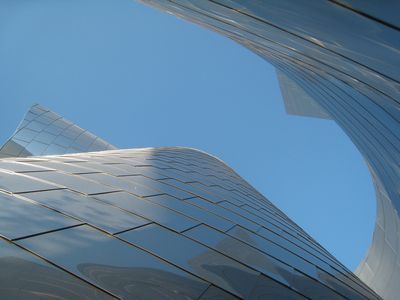Alex Ross's Blog, page 212
November 9, 2011
Fricka still knows
Here is the piece I wrote last spring on Wagner's Walküre, analyzing ten bars of the Wotan-Fricka scene in Act II.
Thomas Mann's Top 12 List
From the Saturday Review of Literature, Oct. 30, 1948:
 Thomas Mann was an early and ardent partisan of the phonograph, even when records sounded "remote and diminutive, as though one were to look at a painting through the wrong end of an opera-glass" — to quote him in The Magic Mountain. It is a privilege, then, to present his choices as the first in a series of phonographic preferences by laymen of note in public affairs. We note, in passing, Mr. Mann's righteous complaint that a dozen choices could scarcely cover his indispensable records, and absolve him of any grievance that may incidentally arise.
Thomas Mann was an early and ardent partisan of the phonograph, even when records sounded "remote and diminutive, as though one were to look at a painting through the wrong end of an opera-glass" — to quote him in The Magic Mountain. It is a privilege, then, to present his choices as the first in a series of phonographic preferences by laymen of note in public affairs. We note, in passing, Mr. Mann's righteous complaint that a dozen choices could scarcely cover his indispensable records, and absolve him of any grievance that may incidentally arise.
FRANCK Symphony in D Minor. Pierre Monteux conducting the San Francisco Symphony Orchestra.
MENDELSSOHN Concerto in E Minor. Nathan Milstein, violin, and the Philharmonic-Symphony Orchestra of New York, Bruno Walter conducting.
MOZART and others A Song Recital by Lotte Lehmann.
BERLIOZ Harold in Italy. William Primrose, violinist [sic], with the Boston Symphony, Serge Koussevitzky conducting.
BEETHOVEN Symphony No. 3 in E flat ("Eroica"). Bruno Walter conducting the Philharmonic-Symphony Orchestra of New York.
WAGNER Parsifal, Act III. Berlin State Opera soloists, chorus, and orchestra, Karl Muck conducting.
WAGNER Die Walküre, Act I. Lotte Lehmann, soprano, Lauritz Melchior, tenor, Emanuel List, bass, and the Vienna Philharmonic Orchestra, Bruno Walter conducting.
BERG Excerpts from Wozzeck. Charlotte Boerner, soprano, and the Janssen Symphony Orchestra, Werner Janssen conducting.
STRAUSS, JOHANN Two Overtures and Two Waltzes. Various European orchestras. Bruno Walter and George Szell conducting.
SCHUBERT "Der Musensohn" (Goethe) and "Der Wanderer" (Schmidt von Lübeck). Gerhard Hüsch, baritone, and Hanns Udo Müller, piano.
SCHUMANN "Romanze" (Geibel) and Schubert's "Der Erlkönig" (Goethe). Heinrich Schlusnus, baritone, and Franz Rupp, piano.
ROOSEVELT "A Prayer for the Nation on D-Day, June 6, 1944." Franklin D. Roosevelt, recorded off the air.
Update: I've had the idea of reviving "My Favorite Records," as the Saturday Review called their list. A Person of Note has agreed to take the lead; her entry will appear in a few days.
November 7, 2011
Feline perspectives: Jonathan Harvey
Beatrice listens intently to Harvey's Bird Concerto with Pianosong, for piano, chamber orchestra, and live electronics. The work appears on a bracing new NMC CD.
The only reviews that matter
"One thing I learned from Pauline [Kael] was that when something hits you that high and hard, you have to be able to travel wherever the point of impact takes you and be willing to go to the wall with your enthusiasm and over it if need be, even if you look foolish or 'carried away.' because your first shot at writing about it may be the only chance to make people care. It's better to be thumpingly wrong than a muffled drum with a measured beat."
— James Wolcott, in his memoir Lucking Out, writing of his first encounter with Patti Smith.
White Light
In this week's New Yorker, I have a review of the White Light Festival, which continues until Nov. 19. (Most shows are sold out, but tickets remain for Olivier Latry's Messiaen organ recital, on Friday, and for Saturday's Huelgas Ensemble event.) I emphasize an astounding trio of concerts that occupied the first weekend: Colin Davis conducting the London Symphony and Chorus in Beethoven's Missa Solemnis; a chamber program centered on Gidon Kremer's playing of the Bach Chaconne; and the Londoners again in Britten's War Requiem, under the direction of Gianandrea Noseda — a performance of enormous polish and startling intensity. I won't soon forget Ian Bostridge's recitation of "Strange Meeting," bitterness turning to wonder. I also have a Critic's Notebook on the new Met Siegfried, praising the clarity of Fabio Luisi's conducting but missing Levine's sense of awe: "If finesse is the goal, Luisi is the man."
November 6, 2011
Klinghoffer at ENO and the Met
A press release from the English National Opera announces details of its forthcoming production of The Death of Klinghoffer, which will have seven performances in February and March of next year. Tom Morris, of War Horse and Jerry Springer: The Opera, will direct; Alan Opie sings the role of Klinghoffer, and Neal Davies is the Captain. "London audiences are my ideal listeners — sophisticated, musically literate, enthusiastic and of course a little bit insane," John Adams says in the release. "I look forward to being among them for the premiere." Of interest to New Yorkers is the information that this Klinghoffer is a co-production with the Met, which plans to stage the opera in the 2014-15 season. The two companies have previously collaborated on Adams's Nixon in China and Doctor Atomic, Nico Muhly's Two Boys, and various other works.
A Lauri-Volpi moment
What's especially remarkable about this prized 1934 recording, aside from the glowing beauty of the voice and the impeccable style, is the sense that Lauri-Volpi is actually improvising the aria as he goes along — just as the dramatic situation requires. I fell into a YouTube Chénier-athon after watching Héctor Sandoval's very honorable account of the role on a new Unitel DVD, from the Bregenz Festival.
November 5, 2011
Appleton
I'm very grateful for the warm reception I received at Lawrence University, where I spoke on Thursday. Five viola students — Maija Anstine, Emma Cifrino, Leslie Fox, Chris Mlynarczyk, and Sarah Vosper — went to the trouble of learning an arrangement of Dido's Lament, which they played during my Chacona lecture. I'm enjoying a couple of CDs of music of Alec Wilder; they were given to me by Robert Levy, a Lawrence emeritus professor and a longtime supporter of the Wilder cause. I have two more appearances coming up: a reading at powerHouse Arena, in DUMBO, on Tuesday, Nov. 8; and a lecture at Boston College on Wednesday, Nov. 16.
November 4, 2011
Borda triumphans
The LA Times reports that the Los Angeles Philharmonic, under the leadership of Deborah Borda, is in unambiguously robust health. The orchestra has been raking in large donations, but more encouraging is the fact that concert revenues are covering the majority of spending ($57.4 million against $96.9 million). Most impressive is this: "The draw for orchestral concerts in the 2,265-seat Disney Hall has held steady at 95% since it opened in 2003." Every once in a long while you find an executive drawing a large salary simply because she is the best at what she does.
November 3, 2011
Spring far ahead
Spring for Music, the annual celebration of inventive orchestral programming at Carnegie Hall, is asking for public comment and voting on submissions for its 2014 season. "While the public vote won't solely determine the programs that are chosen," S4M advises, "it has an influence on the decisions." The public portion of the selection process ends tomorrow; at the moment, a program of Andrew Balfour, Vincent Ho, and Atli Heimir Sveinsson is well in the lead. Programs 1 and 2 will look familiar to those who have been following the rising fortunes of a certain outer-borough orchestra. I'd like to put in a word for Program 26, which offers the following salty combination:
John Luther Adams: Become Ocean (NY Premiere) 45'
Intermission
Edgard Varèse: Déserts 16'
Claude Debussy: La Mer 23'
Become Ocean will be JLA's first large-scale full-orchestral piece. "It will include spatial elements that utilize in full the remarkable acoustics of our hall," the unnamed orchestra writes. "In the event that the New York performance proceeds, the composer will also design the piece from inception to make the maximum effect in Carnegie Hall." This I would like to hear.
Alex Ross's Blog
- Alex Ross's profile
- 425 followers





